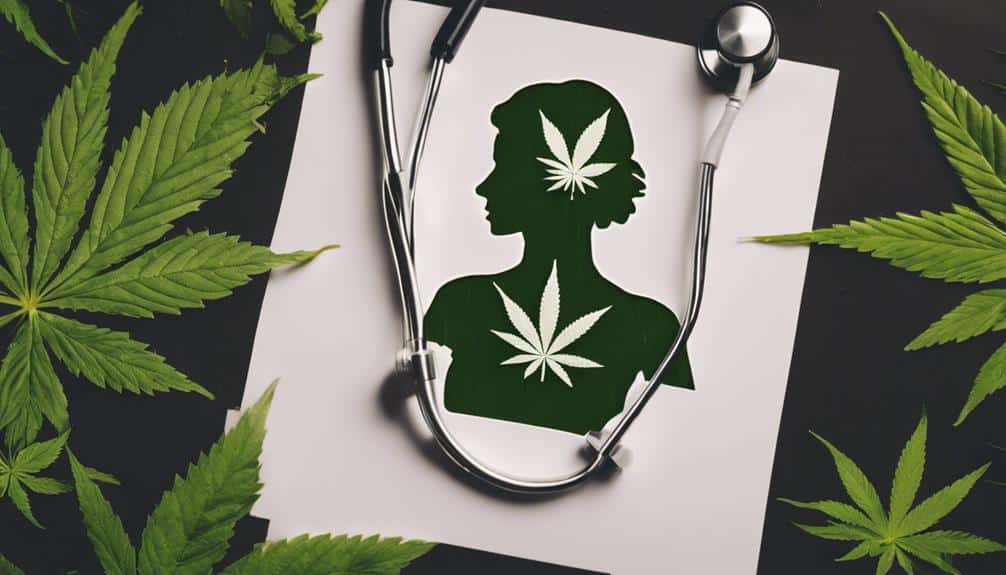Did you know that women in Delaware have higher rates of autoimmune diseases and breast cancer compared to national averages? As we explore the intersection of women’s health and medical marijuana in Delaware, it becomes apparent that this alternative treatment may offer relief for a variety of health issues. However, it’s not a one-size-fits-all solution. What practical considerations should women in Delaware consider when contemplating medical marijuana as a treatment option? Stay with us as we delve into an enlightening discussion that could alter your perspective on this potential remedy.
Table of Contents
Understanding Medical Marijuana

The term ‘medical marijuana’ might seem perplexing, but it simply refers to cannabis used for therapeutic purposes. When you delve into cannabinoid science, you’ll discover that cannabis contains compounds called cannabinoids which interact with the body’s endocannabinoid system to help maintain homeostasis or balance.
The therapeutic applications of medical marijuana are extensive. Evidence suggests it can alleviate chronic pain, reduce nausea during chemotherapy, and mitigate symptoms of conditions like multiple sclerosis. Furthermore, ongoing research aims to uncover new potential uses for this versatile plant.
However, it’s crucial to understand that not all cannabis is created equal. Different strains contain varying levels of cannabinoids and the effects can differ greatly depending on the specific combination. This means that the right strain and dosage for each individual can vary, necessitating careful guidance from healthcare professionals.
In serving others, especially in healthcare, it’s essential to stay informed about the potential benefits and risks of medical marijuana. By doing so, you can help patients make informed decisions about their healthcare and potentially improve their quality of life. This understanding forms the groundwork for our discussion on ‘Delaware’s Medical Marijuana Laws’, which we’ll delve into next.
Delaware’s Medical Marijuana Laws
Now that we’ve explored the basics of medical marijuana, let’s focus on Delaware’s specific laws governing its use.
- Qualifying Conditions: In Delaware, you can legally use medical marijuana if you’ve been diagnosed with a severe, debilitating condition such as cancer, Alzheimer’s, or PTSD.
- Application Process: To legally purchase from Delaware dispensaries, you’ll need to apply for a Medical Marijuana Card. The process involves a physician’s recommendation, patient application, and a fee.
- Legal implications: Although it’s legal to use medical marijuana in Delaware for approved conditions, it remains illegal under federal law. This dichotomy can lead to legal complexities.
- Purchase and Possession Limits: Once approved, you can buy up to three ounces of medical marijuana every two weeks from licensed Delaware dispensaries. However, you can’t possess more than six ounces at any given time.
A thorough understanding of these laws is crucial for those seeking to benefit from medical marijuana in Delaware. It is also vital for those who aim to serve the community by ensuring safe and legal access to this treatment option. Always remember: when it comes to medical marijuana—staying informed means staying compliant.
Women’s Health Concerns in Delaware

Turning our attention to women’s health in Delaware, it’s important to note that certain concerns, such as breast cancer, osteoporosis, and autoimmune diseases disproportionately affect women in the state. This unequal burden is further compounded by gender inequality in healthcare, which can result in subpar treatment or overlooked symptoms for women.
Breast cancer is a leading cause of death for women in Delaware with rates higher than the national average. Osteoporosis is also prevalent; nearly one in two women over the age of 50 in Delaware are likely to break a bone due to this condition. Autoimmune diseases disproportionately affect women with conditions like lupus and multiple sclerosis being more common in women than men.
This gender inequality isn’t just about physiological differences—it also involves systemic biases that steer women towards less effective treatments or prevent them from accessing healthcare at all. Ignoring these concerns doesn’t just harm women’s health—it affects the wellbeing of entire communities. After all, when women thrive—so does society.
Medical Marijuana’s Role in Women’s Health
Exploring the potential of medical marijuana for addressing women’s health issues reveals promising solutions for conditions that disproportionately affect Delaware’s female population. From menstrual relief to managing symptoms of endometriosis, medical marijuana emerges as a viable alternative to traditional medicine.
Cannabinoid research has uncovered several key benefits for female health:
- Menstrual Relief: Medical marijuana can alleviate severe menstrual cramps and regulate mood swings providing much-needed relief during this period.
- Mental Health: It has been found helpful in managing symptoms of anxiety and depression, conditions that statistically affect more women than men.
- Chronic Pain: Medical marijuana can help manage the chronic pain associated with conditions like fibromyalgia, which predominantly affect women.
- Endometriosis: It can also help manage the pain and inflammation resulting from endometriosis.
It’s important to remember that every woman’s body is unique, and what works for one may not work for another. So while medical marijuana presents potential benefits for women’s health, it should be taken under the guidance of a healthcare professional. As you continue to serve others in your community, keep these points in mind to help women make informed health decisions.
Case Studies: Marijuana for Women’s Health

Diving into real-world cases provides compelling examples of how medical marijuana has been instrumental in addressing various women’s health issues. In one case, a woman suffering from severe endometriosis experienced significant relief after incorporating the right cannabis strains into her regimen. This shift allowed her to manage her chronic pain more effectively and substantially improve her quality of life.
In another case, a woman dealing with debilitating migraines turned to medical marijuana after unsuccessful trials with numerous pharmaceuticals. Through careful dosage optimization, she was able to drastically reduce the frequency and intensity of her migraines.
These cases underscore the importance of selecting appropriate cannabis strains and optimizing marijuana dosage. It’s crucial to understand that each individual’s response to different strains and dosages can vary. Therefore, a tailored approach is often necessary to ensure optimal results.
In both cases, medical marijuana proved to be a game-changer. It’s clear that when used appropriately, it can offer significant benefits for women’s health. However, it isn’t a one-size-fits-all solution. Every woman’s health journey is unique, and medical marijuana is one tool among many that can potentially improve health outcomes.
Future Outlook: Women’s Health and Medical Marijuana
Looking ahead, the role of medical marijuana in women’s health holds vast potential for growth and further research. We may anticipate the following developments:
- Marijuana policy changes: As societal attitudes towards marijuana evolve, we can expect more states to legalize its medical use—expanding access and research opportunities in women’s health.
- Increased research: With more relaxed regulations, scientists will have greater freedom to delve deeper into the therapeutic benefits of medical marijuana for women’s health issues.
- Innovation in delivery methods: The future of medical marijuana isn’t just about smoking; expect innovations in delivery methods such as edibles, oils, and capsules—making it easier for women to incorporate into their healthcare regimen.
- Educational initiatives: As we gain more understanding about marijuana’s benefits there will be an increase in educational initiatives aimed at healthcare providers and patients alike.
In essence—the future of women’s health and medical marijuana in Delaware looks promising—a landscape filled with potential driven by policy changes, increased research, innovative delivery methods, and educational initiatives.
Conclusion
Navigating the complexities of women’s health can be challenging, but medical marijuana in Delaware provides a beacon of hope. Its potential to alleviate symptoms and improve well-being is truly revolutionary. However, it’s not a universal remedy. With the help of healthcare professionals, women can tailor their unique path to healing and relief. The future of women’s health and medical marijuana in Delaware is still being written—but it’s a narrative brimming with promise and potential.
We warmly invite you to explore this promising field with us at Cannabis Docs of Delaware. If you’d like to learn more about the benefits of medical marijuana and its potential role in women’s health—don’t hesitate to give us a call at (855) 420-6797. We’re here to answer any questions you may have and help you understand the possibilities that medical marijuana might hold for you. Remember—your health journey is unique, and we’re here to support you every step of the way.

